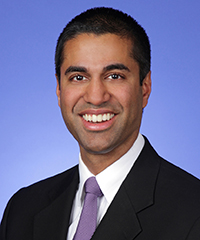Net Neutrality.
We have three days.
AT&T has promised to ‘be good’ if the FCC overturns Net Neutrality rules. The problem is, we can’t trust AT&T. Or Verizon. Or Comcast.
If the five-member FCC commission votes on Thursday, Dec. 14th, to overturn Net Neutrality, consumers will eventually be asking, “What just happened?’ Slate Magazine gives us some clarity to the usually glossy-eyed Net Neutrality complexity.
What will an internet without Net Neutrality be like? We can look to other countries for the answer.
[Slate]
<The scary part is that it might happen piecemeal, with one free service here and one slower website there.>
“…studies suggest that providers can find many ways to extract fees from subscribers, steer their buying habits, and charge websites and online platforms to get priority access to internet users.
In many countries without net neutrality, mobile plans are the worst culprit. Take what happens in Guatemala, for example. “Many people will have two SIM cards there because on one SIM card they can access WhatsApp for free, and on another SIM card you access Facebook for free,” says Renata Avila, a senior adviser at the Web Foundation. If you buy a small amount of data that gets used up quickly, WhatsApp will still be accessible after the cap is reached, but not the rest of the internet. If you do try to access other websites or apps, you’ll be prompted to pay more. Similar mobile internet plans exist in Balkan countries, Avila said, but there you might buy a SIM card that favors Viper, a popular messaging service in that region.
This practice is also common throughout the European Union. The EU has net neutrality laws, but they don’t outright prohibit mobile plans that allow users to only access certain apps without cutting into their data plans. Rep. Ro Khanna, a Democrat from California, described the situation in Portugal in a tweet that went viral in October. The tweet showed a page from Meo, a mobile and home internet provider in Portugal that offers various packages made up of websites and apps that don’t cut into your monthly data plan.
Beyond not charging for access to particular websites or apps, there are also cases of internet providers straight-up blocking access to certain kinds of apps. In Morocco in 2016, multiple internet providers agreed to block voice over internet services, like Skype or WhatsApp, potentially in an effort to push users to subscribe to phone plans. Unhappy Moroccans heavily protested the ban, which was lifted months later.
In a particularly egregious case in Canada in 2005, the telecom company Telus blocked access to a union website that promoted a labor strike against the internet company. In 2012, AT&T announced it would block U.S. users’ access to FaceTime on iPhones unless they paid for a higher data plan, but it reversed course after consumer advocates sent complaints to the FCC.
The internet could become more homogenized in turn, as fewer people continue to contribute to niche communities.”
Commissioner Jessica Rosenworcel said that the plan to roll back net neutrality is “worse than one could imagine.” She wrote an op-ed piece for the LATimes titled, “I’m on the FCC. Please stop us from killing net neutrality.”
Killing net neutrality, she adds, is “a lousy idea. And it deserves a heated response from the millions of Americans who work and create online every day.”
“Your broadband provider could carve internet access into fast and slow lanes, favoring the traffic of online platforms that have made special payments and consigning all others to a bumpy road. Your provider would have the power to choose which voices online to amplify and which to censor. The move could affect everything online, including the connections we make and the communities we create. This is not the internet experience we know today. Americans should prevent the plan from becoming the law of the land.”
3 Republicans (all men) are expected to vote along party lines against Net Neutrality — 2 Democrats (both women) are in favor of keeping Net Neutrality.
The chair, Ajit Pai, appointed to the commison by President Obama ini 2012 on the recommendation of Mitch McConnell, was appointed to chair this year by DT. He is leading the ‘end Net Nuetrality’ charge. Verizon is being targeted, a call-to-action explains, because Pai “is a former top lawyer for Verizon, and the company has been spending millions on lobbying and lawsuits to kill net neutrality so they can gouge us all for more money.”
https://www.fcc.gov/about/leadership
Here’s what we can do:
CALL Ajit Pai, FCC Chairman
202-418-1000
Your script:
Hi, my name is [NAME] and I’m a concerned customer from [Hailey].
[IF FCC]: I’m calling to express my disapproval that the FCC is trying to kill net neutrality and the strong Title II oversight of Internet Service Providers. Preserving an open internet is crucial for fair and equal access to the resources and information available on it. Thank you for your time and attention.
[IF LEAVING A VOICEMAIL: please leave your full street address to ensure your call is tallied]
We only have 3 days to fight the FCC & the repeal of #NetNeutrality! Thanks to John Oliver there’s a SUPER easy way to do this. Here’s what you can do – takes less than a minute. 1. Go to gofccyourself.com (the shortcut John Oliver made to the hard-to-find FCC comment page) 2. Click on “express” 3. Hit “enter” after you put in your name & info so it registers. 4. In the comment section write, “I strongly support net neutrality backed by Title 2 oversight of ISPs.” 5. Click to submit, done. – Make sure you hit submit at the end! If you want to spread the word write “congratulations” in the comments so that FB’s silly algorithm puts it at the top of feeds.


Leave a Reply